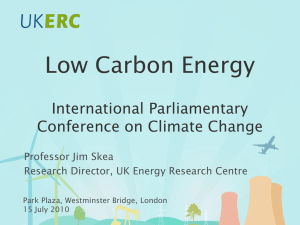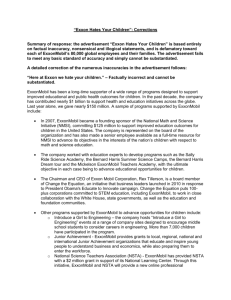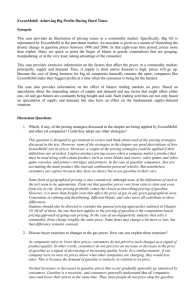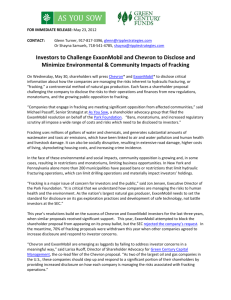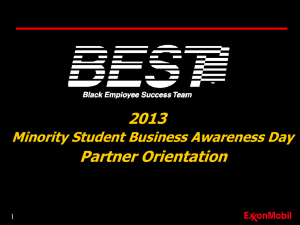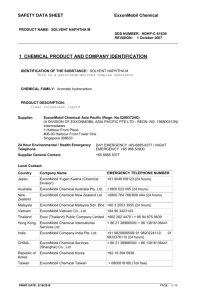ExxonMobil in Indonesia
advertisement
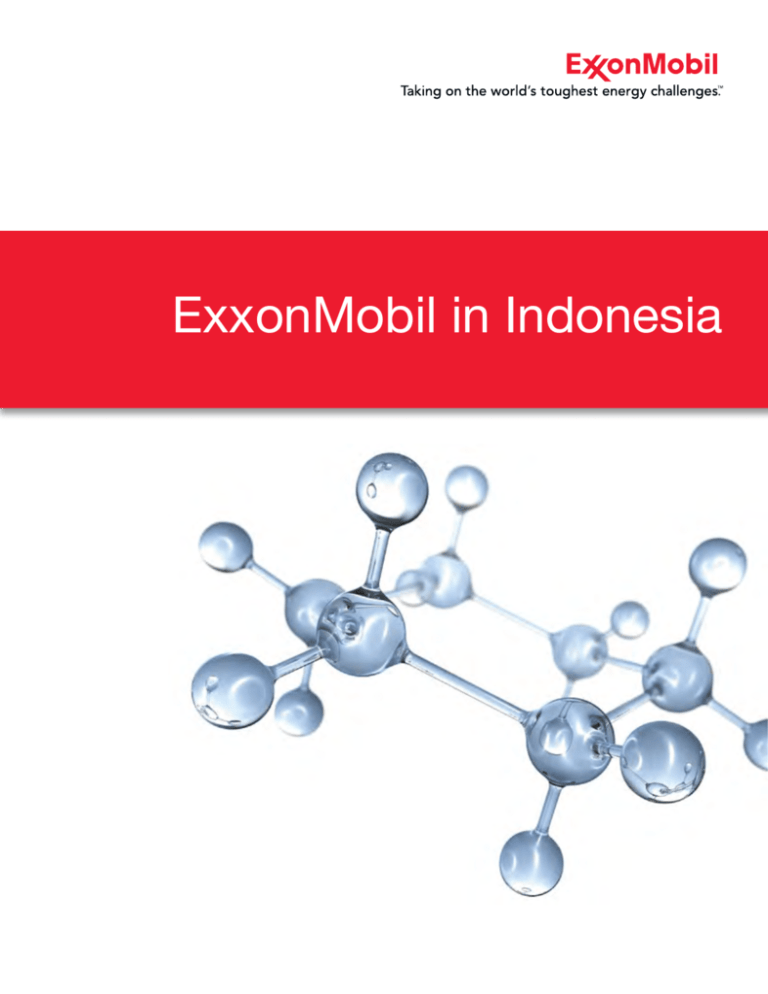
ExxonMobil in Indonesia Contents pg. 03 Who we are pg. 04 What we do pg. 05 How we operate pg. 06 ExxonMobil Areas of Operations in Indonesia Aceh Production Operations Cepu Block Explorations Areas pg. 10 ExxonMobil Community Engagement Education Health Economic Development Who we are “We are the world’s largest publicly traded international oil and gas company, providing energy that helps underpin growing economies and improve living standards around the world.” Profile Our history ExxonMobil is the world’s largest publicly traded integrated petroleum and natural gas company. Our company and its affiliates are present on a global scale. Over the last 125 years ExxonMobil has evolved from a regional marketer of kerosene in the U.S. to the largest publicly traded petroleum and petrochemical enterprise in the world. Today we operate in most of the world’s countries and are best known by our familiar brand names: Exxon, Esso and Mobil. We make the products that drive modern transportation, power cities, lubricate industry and provide petrochemical building blocks that lead to thousands of consumer goods. Learn more by using the slider or the arrows below to browse our history over time. We operate facilities and market products around the world, and explore for oil and natural gas on six continents. We lead the industry in almost every aspect of the energy and petrochemical business. To help meet the world’s growing energy needs, ExxonMobil is involved in the exploration and production of crude oil and natural gas; the manufacture of petroleum products; and the transportation and sale of crude oil, natural gas, and petroleum products. We are a major manufacturer and marketer of commodity and specialty petrochemicals and have interests in electric power generation facilities. Our extensive research programs support operations, enable continuous improvement in each of these businesses, and explore emerging energy sources and technologies. • Upstream The company holds exploration and production acreage in 38 countries and conducts production operations in 23 countries around the world. • Downstream We have interests in 37 refineries, and fuels and lubes marketing activities around the world. We are the largest global refiner, manufacturer of lube basestocks, and supplier/marketer of petroleum products. • Chemical We are a global leader in the petrochemical industry. Over 90 percent of our chemical businesses rank first or second, by market position, worldwide. • Technology Over the past five years, ExxonMobil has invested more than $5 billion in technology. Our diverse workforce ExxonMobil is committed to attracting, developing, and retaining the best people from the broadest possible employee pool to meet our business needs worldwide. Workforce nationalization We believe we have a responsibility to build a legacy of economic progress by maximizing the number of local employment opportunities, and by investing in the workforce of our host countries, in particular in emerging and developing economies. Our strategy is to increase the number of national employees over the life span of a project and to train them in technical and professional skills necessary for working on existing and future projects and operations. Over the long term, this helps us develop a pool of talented employees to meet future business needs around the world, beyond supporting local operations. 3 What we do Every day, employees at ExxonMobil are committed to the pursuit of operational excellence. We do this by delivering safe, reliable operations, improving energy efficiency, and maintaining strong business controls. We believe that maximizing the value of resources – through disciplined investments, developing breakthrough technologies, improving processes, and integrated operations – generates the most benefit for resource owners, society, and our shareholders. • Exploration ExxonMobil’s exploration strategy is to identify, evaluate, pursue, and capture the highest quality opportunities around the world. • Development We continue to focus on disciplined investment decisions and industry-leading project execution to deliver superior returns from Upstream projects. • Production We apply the most cost-effective technology and operations management systems to all assets to maximize the commercial recovery of hydrocarbons. • Natural Gas and Power Marketing ExxonMobil leverages its network of commercial experts and knowledge of global energy markets to capture the full value of growing gas and power markets. 4 • Refining and Supply We integrate a global network of reliable and efficient manufacturing plants, transportation systems, and distribution centers to provide fuels, lubricants, feedstocks, and other highvalue products to our customers around the world. • Fuels Marketing We provide long-term value by selling high-quality products and services daily to millions of customers across the globe. • Lubricants and Specialties We are a leading marketer of finished lubricants, asphalts, and specialty products, as well as the world’s No. 1 supplier of lube basestocks. • Chemical ExxonMobil has developed a unique portfolio of commodity and specialty businesses over many years, built on proprietary technology and a high degree of raw material integration. How we operate Good governance — both by the public and private sector — is essential for creating an economic climate that is conducive to large-scale investments, leading to the long-term sustainability of business. Standards of Business Conduct Our Standards of Business Conduct provide a framework for responsible operations with regard to employment practices around the world. Ethics ExxonMobil expects employees to adhere to all company policies and to be responsible for reporting suspected violations of the law or corporate policy to management. Management Systems Our commitment to high ethical standards is implemented through our global policies and practices — in every aspect of our business, at every location where we operate. Long-term Financial Resource Management It is our responsibility to help meet the world’s growing energy needs while providing competitively priced supplies to our customers and delivering value to our shareholders. Safety and Health Management At ExxonMobil, excellence in safety and health in the workplace is a core value. A healthy workforce is a necessary foundation for economic growth and critical to achieving our business objectives wherever we operate. Environmental Management and Planning Wherever we operate, we meet local regulations for environmental performance, and where there are no local regulations, we operate to standards that we believe are protective of the environment. National Content One of the most important contributions we make to the countries in which we operate is to ensure that the benefits from our projects are sustainable over the long term and that the government and communities do not depend solely on our presence. Employment Policies and Practices ExxonMobil strives to create a work environment that is safe and rewarding for each of our approximately 80,000 people — our success as a company depends on their individual contributions. 5 ExxonMobil Areas of Operations in Indonesia Aceh Production Operations ExxonMobil operates the Arun Field in Nanggroe Aceh Darussalam Province as a Cooperation Contract Contractor (KKKS) to Badan Pelaksana Minyak dan Gas (BPMIGAS), the Indonesian Upstream Oil and Gas Regulatory Body. ExxonMobil affiliates also operate the South Lhoksukon A and D, as well as North Sumatra Offshore (NSO) offshore gas field. ExxonMobil affiliates hold a 100% Participating Interest in the above mentioned fields. Gas produced from these fields is supplied to the PT Arun Natural Gas Liquefaction (NGL) facility, where the gas is processed into liquefied natural gas, or “LNG”. ExxonMobil has also supplied gas to local fertilizer plants and a paper mill. At its peak, the Arun Field produced about 3.4 billion cubic feet of gas per day (1994) and about 130,000 barrels of condensate per day (1989). LNG from PT Arun was first exported to Japan in 1978. In September 2009, ExxonMobil received a Green PROPER award from the Ministry of Environment for demonstrating full innovation and dedication toward the environment and sustainable community development. The award recognizes on businesses/activities that have undertaken environmental management efforts that achieve results above and beyond what is required by applicable regulations in Indonesia. 6 Cepu Block The Cepu Cooperation Contract (KKS) was signed September 17, 2005 and covers the Cepu Contract Area in Central Java and East Java. Mobil Cepu Ltd. (MCL), Ampolex Cepu Pte Ltd., Pertamina EP Cepu and four Local Government Companies PT Sarana Patra Hulu Cepu (Central Java), PT Asri Dharma Sejahtera (Bojonegoro), PT Blora Patragas Hulu (Blora) and PT Petro Gas Jatim Utama Cendana (East Java) together comprise the Contractor under the Cepu KKS. ExxonMobil holds 45 percent of the total Participating Interest in the Cepu Block. The Cepu KKS will continue until 2035. A Joint Operating Agreement (JOA) was entered into by the Contractor parties, ExxonMobil serves as the operator of the Cepu KKS on behalf of the Contractor. Cepu Project development and production is expected to have a positive impact on other industries and local communities in Java through increased economic output, jobs, and community development projects. Banyu Urip Project The Banyu Urip project is the first development under the Cepu Contract Area and involves the development of the Banyu Urip oil field. The Banyu Urip field discovery was announced in April 2001 and is estimated to contain approximately 375 million barrels of oil. At planned peak production, Banyu Urip is expected to produce as much as 165 thousand barrels of oil per day. At these expected peak production ratio, the government of Indonesia will receive $4-17 billion (based on assumed $20-50/ bbl oil price) over the life of the project, including taxes, bonuses, Domestic Market Obligation and the government’s share of the oil. In addition, Pertamina and local government companies could earn $0.9-1.6 billion total as Contractor parties (under the same price assumption). Early Production Facilities First oil production in limited quantities from the Banyu Urip field commenced in December 2008. The Early Production Facility (EPF) with capacity to produce up to 20,000 barrels of oil per day, started in August 2009. Full Field Development Full Field Development consists of Central Processing Facilities, onshore and offshore pipelines and Floating Storage and Offloading Facility.The Central Processing Facility (CPF), situated about 10 km southeast of Cepu and 20 km southwest of Bojonegoro in the centre of the oil field, will process and treat the crude oil produced. The treated oil will be transported through a new 20 inch insulated buried pipeline to the coast at Tuban and thereafter through a sub sea pipeline to a Floating Storage and Offloading (FSO) facility. Oil transportation tankers will load crude oil from the FSO for transportation to domestic and world markets. Oil recovery from the Banyu Urip field will be maximized by water injection wells to help maintain pressure in the reservoir and sweep the oil to the producing wells. The injection water will be supplied from produced water and flood water from the Bengawan Solo River during rainy season. Natural gas produced along with the crude oil will be used for power generation at the CPF. The project is continuing to progress land acquisition and major contract tendering activities for the full project. Exploration in Cepu Block In 2008 a successful appraisal well was drilled at the Jambaran field. Currently ExxonMobil is progressing with acquisition seismic activities in Blora Regency and exploration drilling at the Alas Tuwa West and Alas Tuwa East field in Bojonegoro Regency. 7 ExxonMobil in Indonesia ACEH NATUNA D-ALPHA SURUMANA SU RA AT M CENDRAWASIH KALIMANTAN SULAWESI PAPUA JAVA MANDAR COALBED METHANE CEPU 8 GUNTING New Exploration Areas Cendrawasih Block ExxonMobil, together with an affiliate of Black Gold Energy, signed a Production Sharing Contract in May 2009 for the Cendrawasih Block located offshore Papua. The Cendrawasih Block comprises of 4,991 square kilometers. Gunting Block "The Gunting Block encompasses an area of 1645 square" kilometers located onshore and offshore East Java. The Gunting Block work program includes 400 km of 2D-seismic and geological studies during the first three years. Surumana Block In 2006, ExxonMobil signed a Production Sharing Contract for the Surumana Block located in the Makassar Strait offshore Sulawesi. Petronas Carigali Sdn. Bhd. farmed in an acquired 20 percent interest in the block. With water depths ranging to more than 2,300 meters, exploration activity on this deepwater block is very challenging. Mandar Block In early 2007, ExxonMobil signed a Production Sharing Contract for the Mandar Block located in the Makassar Strait. Petronas Carigali Sdn. Bhd. farmed in an acquired 20 percent interest in the block. The Mandar block comprises an area of 4,200 square kilometers (1 million acres), and is located in the Southern Makassar Basin, west of the districts of Polewali Mandar and Majene, in water depths ranging to more than 2,000 meters (6,000 feet). In February 2008, ExxonMobil successfully completed acquisition of 3D seismic data that covered an area of 1,725 square kilometers. ExxonMobil was the first operator to complete 3D seismic in this exciting new exploration area. ExxonMobil has drilled three exploration wells on the block. ExxonMobil, successfully completed acquisition of 3,300 kilometers of 2D seismic data in 2007 and drilled the first well on the block in 2009 9 ExxonMobil Community Engagement Wherever you find ExxonMobil, you will find a company committed to the well-being of the communities where we do business and where our employees live and work. That commitment includes corporate contributions and employee volunteerism in tens of thousands of communities around the globe. With a strong commitment to the future of Indonesia, ExxonMobil consistently strives to be a responsible member of the communities in which it conducts its important natural resource development projects. We are committed to supporting the needs and aspirations of the local people by contributing to programs that improve the quality of life of our neighboring communities. ExxonMobil companies in Indonesia place emphasis on three focus areas, Education, Health, and Economic Development. Since 2004, ExxonMobil has been working with communities and local agencies to develop Community Partnership Programs, which involve the communities in all phases of each program, including in the decision 10 making, design, implementation, control and evaluation processes. At our Aceh operations, there are approximately 170 villages located adjacent to our facilities. About 8,000 families live in the 12 subdistricts surrounding our facilities. ExxonMobil has contributed to programs that assist the Arun area communities to improve their income generation potential through various economic development programs, such as cattle fattening, fisheries, vocational skills, cocoa plantation, and home industries. In addition, we have provided jobs, built roads, schools, public halls and mosques, and donated regularly to community social and religious activities. Additionally, ExxonMobil has also provided its neighbors with humanitarian support and assistance, especially following natural disasters that threaten significant social disruption. Health Education Since 2003, ExxonMobil in Indonesia has also supported the Semai Benih Bangsa (SBB) pre-School program in partnership with the North Aceh Women’s Group and Indonesia Heritage Foundation (IHF). The SBB program was initiated and is managed by the North Aceh Women’s Group to provide an intensified educational experience for children prior to entering the formal school system. The program is focused on reaching underprivileged children aged from 3-7 years old. As part of this program, ExxonMobil assisted in renovating a number of community meunasahs or public halls and established playgroups in villages across the North Aceh area. We also sponsored community appointed “teacher” candidates to the teacher training program in Jakarta as well as refresher training for teachers in Lhokseumawe. A total of 133 SBB schools have been established across North Aceh. In 2010, ExxonMobil extended the program to East Java and have since supported 51 SBB schools in that area. A Water and Sanitation Program was initiated in 2008 to address shortages of clean water, especially during the dry season in Bojonegoro and Blora. Beneficiaries of the program come from 11 villages, with more than 3,000 households served by village water committees. Together, each community drilled one waterwell, built water towers and installed the distribution system. They also voluntarily donated land and building materials. Mentoring for this program was available from ExxonMobil’s partners: Farabi, Aksi Cepat Tanggap, and Dompet Dhuafa Republika. An additional benefit of the program is the reduction of waterborne illnesses. In North Aceh, ExxonMobil helped transform its Civic Mission Clinic (CMC) in Landing into a Community Mental Health Center. Together with Layanan Kesehatan Cuma-Cuma (LKC), ExxonMobil worked with the District Health Office (DHO) to use the CMC facility to establish a prominent mental rehabilitation center in Aceh. ExxonMobil handed over CMC's assets and medical equipment to the North Aceh Government in 2009, along with capacity building for DHO to operate the center. The center serves an average of 157 mental patients per day—who pay only a nominal medication fee— supported by Community Mental Health Nurses, dedicated general practitioners, and voluntary Mental Health Alert Village Officers. Since January 2010, the center has been fully operated by DHO. 11 ExxonMobil Community Engagement Economic Development Microfinance Program for Local Community ExxonMobil Women’s Economic Opportunity Initiative ExxonMobil has developed a microfinance program in Indonesia as a tool to recognize entrepreneurs, generate income, and reduce poverty. The program customizes the Grameen credit system which makes small loans to the impoverished without requiring collateral and utilizes peer monitoring to ensure that borrowers act responsibly, repay the loan, maintain good credit standing, and at the same time learn new skills. The ExxonMobil Women’s Economic Opportunity Initiative is a global effort launched in 2005 that helps women in developing countries fulfill their economic potential and drive economic and social change in their communities. Since May 2006, over 6,600 women from across ExxonMobil is operating areas have benefited from the program, with approximately $380,000 loaned out. Loan amounts are being increased gradually from USD 5 to USD 1,000 depending on credit standing, capacity building, business feasibilities, and group support. Members have used the funds to increase capital for existing businesses, improve efficiency by purchasing new equipment for marketing and to purchase inventory for shops. 12 Research demonstrates that investing in the education, training and leadership of women delivers high returns in terms of economic and social development, including: lower infant and child mortality rates; disease prevention; higher income and productivity rates; and broader economic growth. Healthy and educated communities in which all citizens have the opportunity to play a valuable and productive role help create a stable and prosperous environment for businesses to work in. Preparing women to participate competitively in the economy allows companies, including ours, to have access to the best talent for employee recruitment and development, regardless of gender. We are focused on three key strategies to improve women’s economic opportunities globally: • Build the next generation of female business leaders and entrepreneurs • Reduce barriers to women’s economic participation • Help identify and deploy technologies for women The ExxonMobil Foundation has committed grants totaling more than US$20 million. ExxonMobil have supported in-country projects in Angola, Chad, Colombia, Egypt, Equatorial Guinea, Indonesia, Kazakhstan, Malaysia, Nigeria, Qatar and Thailand and enabled women from 64 developing countries to participate in leadership and skills development programs. These programs have reached thousands of women directly, who have in turn subsequently trained thousands of other women in their communities. In Indonesia, ExxonMobil strives to create a positive and lasting social impact for the community through its strategic community investment programs. As an extension of the program, Exxon Mobil Corporation supported JHPIEGO, an International Health organization affiliated to John Hopkins University, to provide communities in North Aceh with higher quality maternal and newborn care through the availability of qualified village midwives. The expected role of the village midwives is becoming broader and now goes beyond the scope of maternal and child care. They are expected to have the capability to manage infectious diseases and emergency situations, develop surveillance systems and provide comprehensive health education to the community. Therefore, ExxonMobil felt the need to provide a program that would give significant support to the village midwives to enable them to meet these expectations. This program has been implemented in 27 clinical sites, 80 cadres for Desa Siaga and Desa Siaga in seven sub districts in North Aceh. Computer and English Program In Sumengko and Kalitidu villages in Bojonegoro, ExxonMobil has established a local computer and English training program, providing computer laboratories and training in conjuntion with PKBM Garis Tepi, a local NGO, and Microsoft. Since 2006, more than 2,100 participants have benefited from the program. 13 ExxonMobil Relief Efforts ExxonMobil Workforce in Indonesia East Java Flood Since the outbreak of torrential floods in Bojonegoro and the Blora Regencies on 27 December 2007, ExxonMobil has provided emergency relief to the people severely affected by the floods. Working closely with the local government and NGOs, ExxonMobil provided temporary shelters, basic food supplies, life rafts, mobile medical assistance clinics and clean water assistance. ExxonMobil’s workforce in Indonesia is a key to its success. Our track record for businessl success is a direct reflection of the quality of our employees. In addition to the emergency relief assistance, ExxonMobil committed to provide US$ 500,000 (approximately 4.5 billion rupiah) for the rehabilitation program to help the significantly affected areas recover to a better life post the disaster. The initial activity included provision of free medical services to 65 villages which had around 4,200 patients for the first week. Furthermore, in April 2008 the US$ 500,000 (approximately 4.5 billion rupiah) relief aid package immediately went on to support programs such as fogging and abates distribution, mobile health service, health center revitalization, healthy and clean school program, emergency and disaster preparedness program, reducing malnutrition risk program, drainage rehabilitation and seed and fertilizer distribution. Sumatra Earthquake ExxonMobil made a donation of approximately US$300,000 (three billion rupiah) for disaster relief efforts in West Sumatra, in the aftermath of the massive earthquakes that struck near Padang on September 30, 2009. ExxonMobil’s contributions were distributed to local relief organization and NGO for rehabilitation programs to further assist the earthquake victims. In addition to the donation, ExxonMobil employees initiated a fundraising campaign to help victims of the quake that resulted in a donation in excess of US$18,000 to the relief effort. 14 ExxonMobil companies in Indonesia employ approximately 800 people. Over 90 percent of ExxonMobil staff are Indonesians, many of whom work in positions as senior managers, engineers, geoscientists, accountants, and administrative and operations staff. To support our business, we also use the services of numerous local contractors who, in turn, employ additional Indonesian workers. ExxonMobil strives to maintain a positive, productive and supportive work environment throughout its operations. ExxonMobil has long-established programs that help employees develop their skills and we work to maintain and nurture a diverse and highly talented workforce. In 2009, ExxonMobil trainees from across the nation graduated from the training program in Pusat Pendidikan dan Pelatihan (PUSDIKLAT) Migas (Oil and Gas Training Center). The program was kicked off as a means of developing a national work force that will ultimately operate and manage the Banyu Urip CPF (Central Processing Facility), pipeline and offshore terminal. During the twoyear program, trainees completed a curriculum that included English language immersion along with Basic Oil and Gas and Advanced Craft Skills training. In our downstream business, PT ExxonMobil Lubricants Indonesia (PT EMLI) has a wide distributor network. The distributors employ in excess of 1,000 people involved in storage, distribution and selling of Mobil-1 branded lubricants. ExxonMobil Oil Indonesia Inc. Wisma GKBI Jalan Jenderal Sudirman No. 28 Jakarta 10210, Indonesia 62 21 574 0707 Telephone 62 21 574 0606 Facsimile
